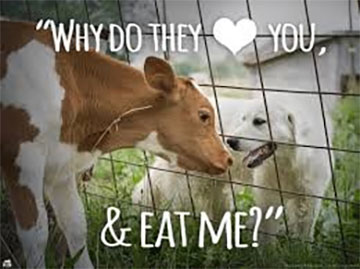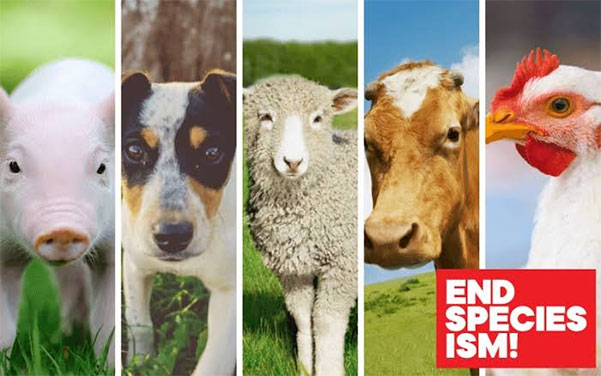Speciesism is arbitrary – it’s a cultural construct and applied inconsistently. Take the dichotomy between China and the US regarding the consumption of dogs. In China, some consider dogs to be food, but in the US, people are horrified at the thought of eating dog meat. Many Americans don’t give a second thought to eating cows, but in India, many consider them sacred. The Japanese kill and eat whales – in stark contrast to the global outcry against the practice.
Jainavenue is a medium to serve the spiritual path of Jainism
Challenging Speciesism: Rethinking Humanity’s Relationship with Animals
February, 2024 by Dr. Kiran Ahuja

Speciesism is also oppressive. This mindset causes humans to draw boundaries to justify the exploitation of animals. It rationalises the use of animals as test subjects, clothing, toys, and food, even though animals are sentient beings and share our capacity for pain, love, joy, and loneliness. Much like humans do, other animals also desire freedom and want to live, but they face discrimination and mistreatment every second of the day.
Our language, too, plays a pivotal role in perpetuating speciesism. The casual use of animal names to describe negative human characteristics, such as calling someone a “pig” to imply repulsiveness or a “dog” to suggest worthlessness and contempt, perpetuates inequalities and hierarchies, reinforcing the belief that humans are superior and justified in their use and abuse of animals. This perception is grossly inaccurate. Pigs are intelligent and can even learn to play video games. They display empathy. If one pig is upset, other pigs will get upset, too. Can you imagine how it feels to be a pig in a slaughterhouse, listening to others of your species scream in agony?
Past and Present Atrocities:
Throughout human history, the act of “othering” has been used to justify dominance and cruelty. In India, differences were once amplified by the British to justify subjugating and ruthlessly exploiting Indians. A similar mindset continues to persist in our treatment of animals today. We magnify differences as an excuse to treat animals cruelly.
Most animals used for food and clothing today are reared on sprawling industrial complexes called factory farms. On average, a meat-eater now consumes double what they would have about 50 years ago. To meet this enormous demand, more than 70% of animals used for food worldwide are bred on factory farms. That’s around 64 billion out of the estimated 92 billion land animals who are used for food every year. Countless fish are factory farmed, too.
On factory farms, animals are confined to cages, crates, sheds, or putrid tanks. There are chilling parallels between factory faming and the systematic extermination of human lives instigated by genocide, slavery, and racism. Just as slaves were denied basic rights and treated as property, animals in factory farms are stripped of their most fundamental rights, abused, and ultimately slaughtered – just for human consumption.
And think about the pet industry. It reflects deeply ingrained prejudices within our society. A preference for foreign “purebred” dogs and cats over indigenous community animals is a type of internalised racism, where we believe foreign is somehow better. Many Indians perceive a pug –a dog bred to be so deformed that he or she struggles to breathe – to be superior to a healthy Indian community dog. Why?
Unlearning Speciesism:
Questioning our own biases can help us identify and unlearn speciesism, which is important because speciesism denies basic rights, perpetuates exploitation, and objectifies animals by regarding them as unthinking and inferior to humans. Humans assess the intelligence of other species typically without considering the impressive traits that animals have and humans don’t, because humans create tests with human qualities in mind.
Each species has the intelligence and capabilities they need to live in their own environments. Gibbons, for example, don’t need to know how to file taxes, but they must be able to recognise which branches are the strongest in order to travel up to 15 metres with each swing and move faster than 55 kilometres an hour through the jungle. Dolphins and toothed whales use echolocation for navigating the ocean and finding food. Elephants appear to communicate over miles through foot-stomping. Tigers and other species leave complex messages via olfactory markings. Pigeons use the Earth’s magnetic field to find their way over vast distances – and the list goes on. Humans can’t naturally do these or many other things that animals can do. We can only attempt to understand how animals make use of the information they gather and the unique ways that they perceive the world.
A professor of anthropological and comparative anatomy once said, “The fact that they [animals] may not understand us, while we do not understand them, does not mean our “intelligences” are at different levels – they are just of different kinds. When a foreigner tries to communicate with us using an imperfect, broken version of our language, our impression is that they are not very intelligent. But the reality is quite different.”
‘Isms’ Affect Humans and Other Animals:
Today, we reject carrying out actions on humans without their consent, but just a few decades ago, prisoners, disabled individuals, the impoverished, and the physically and mentally ill were considered fair game to be experimented on without their permission. The Tuskegee syphilis experiments, for example, were primarily inflicted on poor African American men. Today, many animals are used in experimentation without their consent.
Speciesism is based on the same wrong and irrational justifications as other “isms” – like sexism and racism – that those different from us are less intelligent or don’t have the same capacity to feel pain. And cruelty inflicted on animals and humans due to racism or sexism is often similar in nature. Today, animals used in circuses are forced to perform agonising, bewildering, and demeaning tricks for human entertainment, and animals are imprisoned in zoos for our amusement. As recently as the 1950s, however, there were human zoos that kept so-called ‘primitive’ people from Asia, Africa, and the Americas on display for other people, usually Westerners, to gawk at. Sometimes, they were kept in enclosures alongside animals.

How Can We Stop Speciesism?
Speciesism is a view, not a truth – and the good thing about views is that they can change. To challenge speciesism, we must learn to recognise it in animal abuse and exploitation. It’s our moral duty to shed light on speciesism, spark introspection, and inspire change.
Let’s strive to be on the right side of history, urging others to treat all sentient beings – humans and other animals – with respect. One way we can do this is by going vegan, which will also protect our shared environment, as animal agriculture contributes to the climate catastrophe, exacerbates food scarcity, and devastates our oceans. Raising animals for food requires vast amounts of water, energy, and land and causes deforestation, habitat loss, and species extinction. If we want to protect humans, other animals, and the environment, we all need to choose healthy and humane vegan foods rather than meat, eggs, and dairy.
About Author
Dr. Kiran Ahuja
Dr.Kiran Ahuja works as a manager of vegan projects for PETA India. Previously, she practised as a clinical physiotherapist for seven years and a nutritionist for five.
About Peta:
People for the Ethical Treatment of Animals (PETA) India is country’s prominent Animal Rights organization, guided by a simple yet profound principle – that animals are not ours to experiment on, eat, wear, use for entertainment, or exploit in any other way. PETA India is driven by the unwavering commitment to advocating for the rights and welfare of animals. From dispatching investigators to documenting the cruelty within the meat and leather industries to rescuing animals from the horrors of circuses and laboratories, PETA works tirelessly to enhance the lives of countless animals and save countless others.


Well written and said.
I was recommended this website by my cousin I am not sure whether this post is written by him as nobody else know such detailed about my trouble You are amazing Thanks
Fantastic site Lots of helpful information here I am sending it to some friends ans additionally sharing in delicious And of course thanks for your effort
certainly like your website but you need to take a look at the spelling on quite a few of your posts Many of them are rife with spelling problems and I find it very troublesome to inform the reality nevertheless I will definitely come back again
This webpage is unbelievable. The brilliant data reveals the essayist’s interest. I’m awestruck and expect further such astounding posts.
Wonderful web site Lots of useful info here Im sending it to a few friends ans additionally sharing in delicious And obviously thanks to your effort
This is really helpful advice, especially for individuals who are new to blogging. It’s concise and accurate. I appreciate you sharing this. An piece that is essential reading. Here . Click here for testosterone boosters supplements
Wonderful topic; many thanks for sharing it. You have really inspired me to start a blog. About Dbal Dianabol Alternative
helloI really like your writing so a lot share we keep up a correspondence extra approximately your post on AOL I need an expert in this house to unravel my problem May be that is you Taking a look ahead to see you